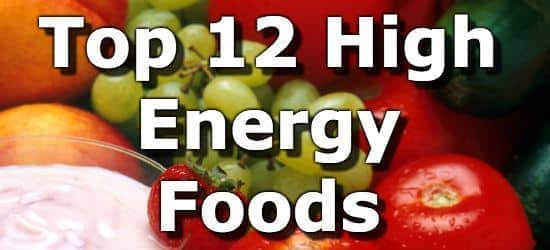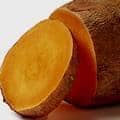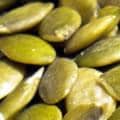Top 12 Foods High in Energy to Keep You Going Through the Day

One of the best ways to lead a healthy lifestyle and maintain a healthy weight is to eat food that sustains your energy levels throughout the day. The following list gives you 12 common foods that have been chosen for their ability to provide the body with energy.
Some of the foods provide slow-releasing energy from healthy carbohydrates, which are the body's main energy source. Others contain a range of important vitamins and minerals involved in cellular energy production processes in the body.
Good quality protein sources are also included, as these are needed for maintaining body tissues, including muscle.
List of Energy Boosting Foods
1 Oatmeal


Oatmeal is one of the best sources of slow-releasing energy from low GI complex carbohydrates, to keep you going all morning. Also a great source of B-vitamins, which are needed to convert food into energy.
Nutrition Facts for Cooked Oatmeal.
Nutrition Facts for Cooked Oatmeal.
2 Spinach


Spinach is high in iron, magnesium, and potassium. Iron transports oxygen around the body, needed for energy production. Magnesium plays a vital role in energy production, and together with potassium, is important for nerve and muscle function.
Nutrition Facts for Spinach.
Nutrition Facts for Spinach.
3 Sweet Potatoes


Sweet potatoes are a fantastic source of complex carbohydrates, along with iron, magnesium, and vitamin C. Vitamin C is needed for transporting fats into the cells of the body for energy production.
Nutrition Facts for Baked Sweet Potatoes.
Nutrition Facts for Baked Sweet Potatoes.
4 Eggs


Eggs are a complete protein, (containing all the essential amino acids), B-vitamins, healthy fats, and some vitamin D. They also provide choline, the precursor for the neurotransmitter acetylcholine, which activates skeletal muscle.
Nutrition Facts for Hard Boiled Eggs.
Nutrition Facts for Hard Boiled Eggs.
5 Fruit


Fruits provide natural sugars, which are quickly absorbed into the bloodstream for an instant pick me up (but without the 'sugar crash' you get after eating refined sugars). Fruits are also high in fiber, vitamins, and antioxidants.
Nutrition Facts for Apricots.
Nutrition Facts for Apricots.
6 Green Tea


Green tea contains some caffeine for an energy boost, but without the 'jittery' side effects of stronger caffeine drinks, such as coffee. Furthermore, green tea may also help lower cholesterol.
Nutrition Facts for Green Tea.
Nutrition Facts for Green Tea.
7 Nuts


Nuts are energy dense due to their high content of healthy fats. They are also high in vitamins and minerals. Soaking nuts in water overnight 'activates' them (starts the germination or sprouting process) increasing the nutrient value even more and making them easier to digest.
Nutrition Facts for Almonds.
Nutrition Facts for Almonds.
8 Soybeans


Soybeans are high in protein, B-vitamins, copper, and phosphorous. Copper and phosphorous are involved in converting food into energy and releasing it into cells so it's available for use by the body.
Nutrition Facts for Edamame.
Nutrition Facts for Edamame.
9 Fish


Fish such as salmon, sardines and mackerel are an excellent source of complete protein, B vitamins, essential fats, and vitamin D. A lack of vitamin D can cause low energy, muscle fatigue, and low mood.
Nutrition Facts for Wild Atlantic Salmon (Cooked).
Nutrition Facts for Wild Atlantic Salmon (Cooked).
10 Seeds (Squash and Pumpkin Seeds)


Seeds are an excellent source of protein, healthy fats and minerals involved in energy production - including manganese, magnesium, phosphorus and zinc. Zinc is needed for the production of hormones in the body that affect energy and mood. It is also important for muscle recovery after exercise.
Nutrition Facts for Roasted Squash And Pumpkin Seeds (Pepitas) (Unsalted).
Nutrition Facts for Roasted Squash And Pumpkin Seeds (Pepitas) (Unsalted).
11 Natural Yogurt


Yogurt contains live bacteria with many health benefits including regulating the immune system, improving digestion (so that more energy-giving nutrients are absorbed) and possibly even improving mood.
Nutrition Facts for Plain Yogurt.
Nutrition Facts for Plain Yogurt.
12 Water


Dehydration is one of the fastest ways to feel your physical and mental energy levels drop. Even mild dehydration of 1-2% can affect mood, energy levels, and ability to concentrate. Drink 8 glasses per day to keep your energy levels up.
Nutrition Facts for Tap Water.
Nutrition Facts for Tap Water.
Tips for Increasing and Maintaining Energy Levels Throughout the Day
- Maintain Balanced Blood Sugar Levels - The energy from a well-balanced meal can last for up to 4 hours, so ideally you don't want to go longer than this without eating. This means having 3 meals and 2 to 3 snacks spread out evenly over the day.
- Avoid High Sugar Foods - High sugar foods can cause a spike in your blood sugar which causes your body to release too much insulin. The surplus insulin then creates a dip in blood sugar levels known as a "sugar crash".
- Choose the right combination of foods for your meals - The best combination for sustained energy that will last the full 4 hours is low GI carbohydrates combined with protein. Low GI carbohydrates release their energy slowly and gradually into the bloodstream. They include sweet potatoes and whole-grains such as oats, brown rice, and whole-wheat bread. Beans and lentils are great as they contain low GI carbohydrates and protein packaged conveniently together. Other good sources of protein include fish, chicken, lean meat, tofu, yogurt, nuts, and seeds.
- Include some healthy sources of fat - Fats such as olive oil, nuts, and oily fish, will help you feel full and keep you from over-snacking.
- Avoid too much caffeine - Too much caffeine actually depletes energy levels in the long term.
Related
MyFoodData provides free nutrition data tools
and articles to help you organize and understand the foods you eat.
Try the recipe nutrition calculator, or daily meal planner.
Create a free account to log and track foods.
